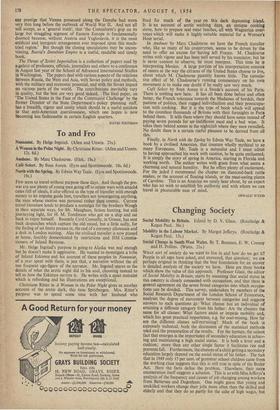To and Fro
Nunamiut. By Helge Ingstad. (Allen and Unwin. 21s.) Anahuac. By Marc Chadourne. (Elek. 18s.) Café Select. By Sven Auren. (Eyre and Spottiswoode. 10s. 6d.)
FEW seem to travel without purpose these days. And though the pre- war era saw plenty of young men going off to minor wars with attaché cases full of ideals, it also offered us the type of traveller with enough money to let impulse guide him, travellers not investigating anything, the man whose motive was personal rather than cosmic. Current travel literature tends to produce a nostalgia for the brothers Waugh in their separate ways, for Mr. Maugham, fiction hunting, but still journeying light, for H. M. Tomlinson who got on a ship and sat back to enjoy himself. Recently Cyril Connolly, in Greece, has sent back despatches which capture the old mood, but a little sadly, for the feeling of set limits presses in, the end of a currency allowance and a desk in London waiting. Alas the civilised traveller is now pinned at home, forcibly domesticated by restrictions and HM Commis- sioners of Inland Revenue.
Mr. Helge Ingstad's purpose in going, to Alaska was real enough but he doesn't make it aggressive. He wanted to investigate a tribe of Inland Eskimos and his account of these peoples in Nunamiut,
of a year spent with them, is just that, a narrative without the all too frequent ego-figure of the narrator. Mr. Ingstad spares us the details of what the arctic night did to his soul, choosing instead to tell us how the Eskimos survive it. He writes with a quiet restraint which is refreshing and his illustrations are exceptional.
Christiane Ritter in A Woman in the Polar Night gives us another account of the arctic dark, this time Spitzbergen. Mrs. Ritter's purpose was to spend some time with her husband who lived for much of the year on this dark depressing island. It is an account of arctic washing days, an antique cooking stove, how to prepare seal meat lunches, all with Wagnerian over- tones which will make it highly suitable material for a Woman's Hour serial.
In Anahuac by Marc Chadoume we have the French traveller who, like so many of his countrymen, seems to be driven by the need to offer an excuse for having left France. M. Chadourne writes with vigour and has been well served by his translator, but he is never content to observe, he must interpret. This time he is interpreting Mexico. A large portion of his interpretation consists of sneers at the way the citizens of the United States choose to live, about which M. Chadourne patently knows little. The cumula- tive effect of M. Chadourne's running commentary on his own movement is to make one doubt if he really saw very much.
Café Select by Sven Auren is a Swede's account of his Paris. There is nothing new here. It has all been done before and often better, the French tolerance towards the Madames of bordels, their pastime of politics, their rugged individualism and their preoccupa- tion with cooking. But it is the type of book which will appeal to the countless thousands of Britons with their fortnights in Paris behind them. It tells them where they should have eaten instead of paying seven pounds for an indifferent meal and a bad wine. It takes them behind scenes in the nightclub where they were swindled. No doubt there is a certain rueful pleasure to be derived from all this.
Finally, in North with the Spring by Edwin Way Teale, we have a book by a civilised American, that creature wholly mythical to so many Europeans. Mr. Teale is a naturalist and I must admit to having approached his work with caution, to be quite enchanted. It is simply the story of spring in America, starting in Florida and working north. The author writes with grace from what seems a charming and natural humility. But he offers plenty of excitement. For the jaded I recommend the chapter on diamond-back rattle snakes, or the account of floating islands, or the meat-eating plants of Carolina. This is an America we rarely hear about, by an expert who has no wish to establish his authority and with whom we can travel in pleasurable ease of mind.
OSWALD WYND


































 Previous page
Previous page